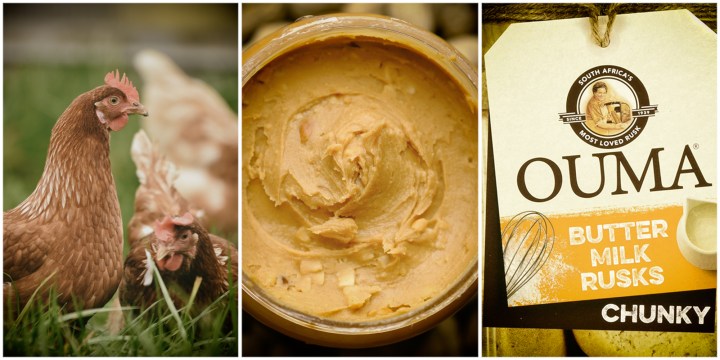COMPANIES
SA food producers RCL, AVI and Sea Harvest hit by rolling blackouts and surging operating costs

Monday was ‘food day’ on the JSE as the three producers released results that could have been so much better if they weren’t forced to hike prices to offset the cost of keeping the lights on.
The South African Sugar Association’s levy, input costs and rolling power cuts have made doing business expensive in South Africa, with RCL on Monday reporting a 46% plunge in annual profits; AVI – whose food products include Five Roses, Baumann’s and Provita – posting a moderate profit; and Sea Harvest registering a hit by cost pressures.
To offset operational pressures, producers were forced to hike prices.
RCL Foods has increased group revenue by 17.3% to R37.8-billion; AVI bumped up revenue by 7.8% to R14.91-billion; and Sea Harvest by 10% to R1.57-billion.
RCL, which produces Ouma Rusks, Selati Sugar, Rainbow and Yum Yum peanut butter, among others, says the sugar industry’s special levy has “materially” hurt its profits, with rolling blackouts affecting all of its operations.
Rolling blackouts cost the company R158.3-million (pretax) in FY 2023 and affected its service levels, particularly in its pet food division.
Despite the decline in annual profits, RCL’s revenue was up 17.3% on last year, mainly due to higher pricing to offset rising input costs. Earnings before interest, taxes, depreciation and amortisation (Ebitda) from continuing operations declined by 24.5%, mainly due to the decline in Rainbow Chicken.
It says its key grocery brands are growing, despite a declining market, and its sugar business delivered a strong result, with Ebitda growth of R62.4-million – despite the levy of R234.4-million. Performance was driven by higher production volumes, increased local sales and continued favourable export pricing.
RCL is currently in litigation with Tongaat Hulett Limited over its business rescue practitioners’ decision to suspend payment of their statutory pre-commencement levies and redistribution payments to the SA Sugar Association, and the default of both Tongaat and Gledhow.
In July, RCL told shareholders that profits for the year to June 2023 were expected to be down at least 30% year on year.
In what it described as an “extremely challenging” operating environment, RCL said agricultural commodity input costs were the biggest contributor to its margin pressure, followed by rolling blackouts which added R158.3- million in direct costs to continuing operations in respect of diesel, generator hire and additional labour requirements.
Consumer demand was also under pressure amid high unemployment levels and double-digit food price inflation during the period.
RCL’s Foods division grew market share in the peanut butter, mayonnaise, rusks, pies and premium pet food categories, but production of some pet food suffered due to cutbacks as a result of power issues.
The main contributors to RCL’s decline were Rainbow (R312.3-million) and the fair value revaluation of its minority shareholding in the LIVEKINDLY Collective (R127.4-million).
“Within the Rainbow business unit, higher revenue driven by higher volumes and prices were insufficient to offset the severe impacts of high feed costs, failing municipal infrastructure and load shedding, resulting in a 74.9% decline in underlying Ebitda,” the company said.
AVI, meanwhile, blamed a “challenging macroeconomic environment” for its performance, with rolling power cuts disrupting operations and costing it R58.5-million, with significant indirect costs.
I&J, an AVI brand, was hurt by higher fuel prices, poor catch rates, rolling blackout costs and lockdowns in Asia affecting abalone sales.
The group also trades in hot beverages, biscuits and snacks, frozen convenience foods, out-of-home ranges, personal care products, cosmetics, shoes, accessories and apparel.
Its group revenue increased by 7.8%, but price increases in all categories were required to offset the weaker rand and rising raw material costs.
Meanwhile, strong demand, higher prices in all markets and a weaker rand have helped buoy Sea Harvest’s results, to offset double-digit increases in fuel and milk prices, as well as sharp increases in rolling blackouts. The seafood group has higher profits and increased revenue.
Its gross profit was up 15%, but operating profit – before interest and tax deductions – was down 9% to R252-million.
Cape Harvest Foods, its second-biggest division, despite a lower supply of milk, rolling blackouts, a load shedding-related fire at Ladismith, and a constrained local consumer, saw a 9% increase in revenue to R1.05-billion while profit decreased by 48% to R29-million.
In its South African Fishing division, despite lower available volumes and challenging fishing conditions, revenue was up 10% to R1.57-billion, benefitting from demand in all markets and channels, higher selling prices and an 8% benefit from a weaker rand.
Accounting for foreign exchange and fuel hedge losses of R5-million, its Fishing segment yielded an operating profit of R238-million – a 1% increase.
Aquaculture’s revenue was up 11% to R62-million (2022: R56-million), with higher selling prices as a result of a recovering Asian market, a higher-value product mix and a weaker rand offset by lower available volumes due to the farms still being in their growth phase.
Its Australian operation saw a 94% increase in revenue to R524-million, benefitting from the inclusion of the Australian fishing group, MG Kailis, and a weaker rand to the Australian dollar.
RCL and Sea Harvest shareholders won’t receive dividends this year, but AVI directors have declared a final dividend of 310 cents per share and an ordinary dividend up 4.3%. DM


















Comments - Please login in order to comment.